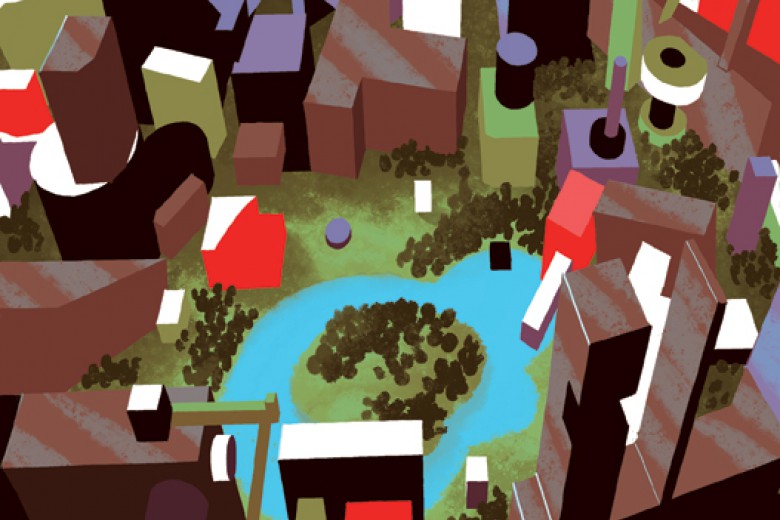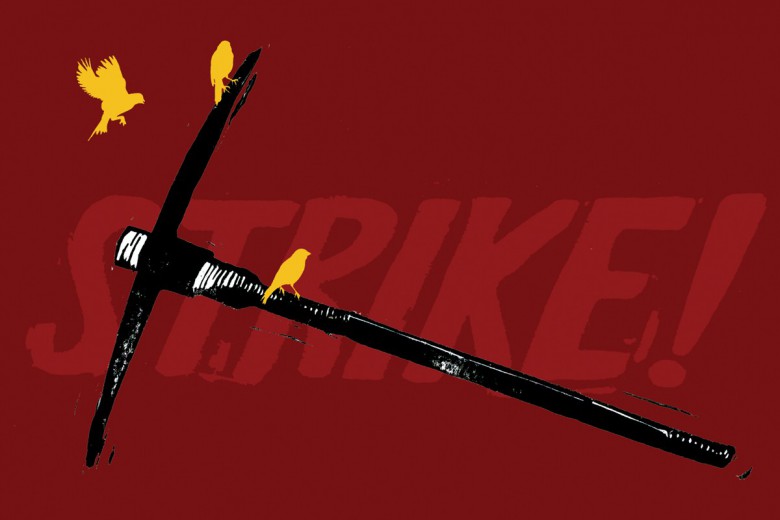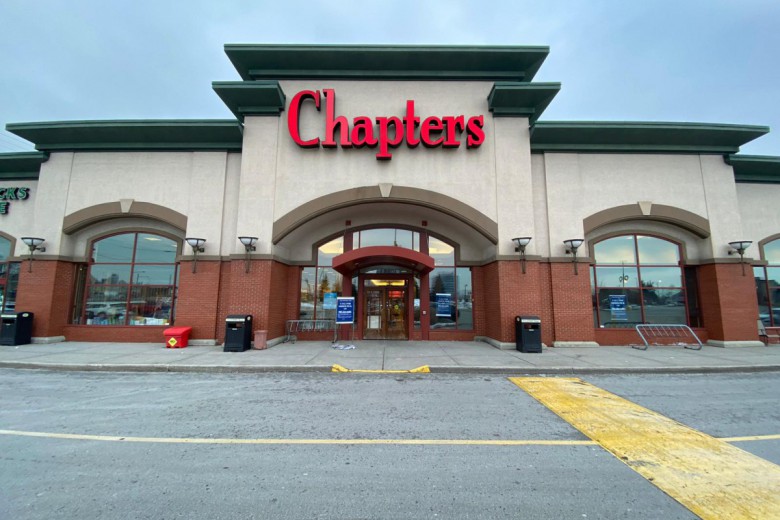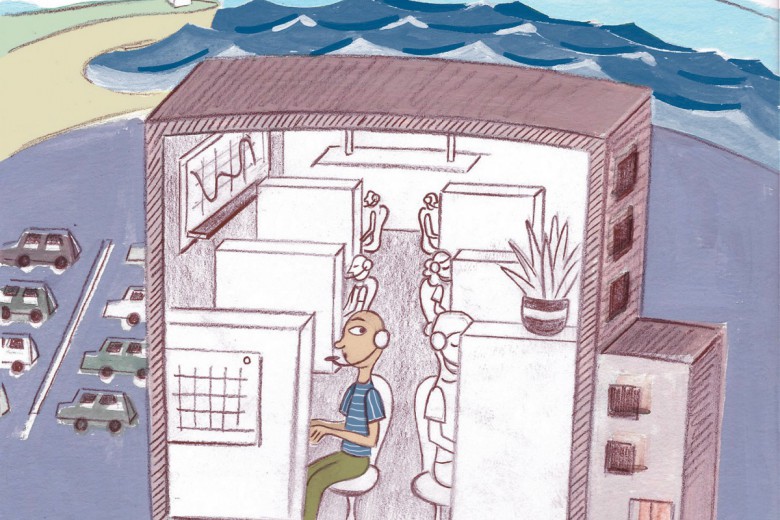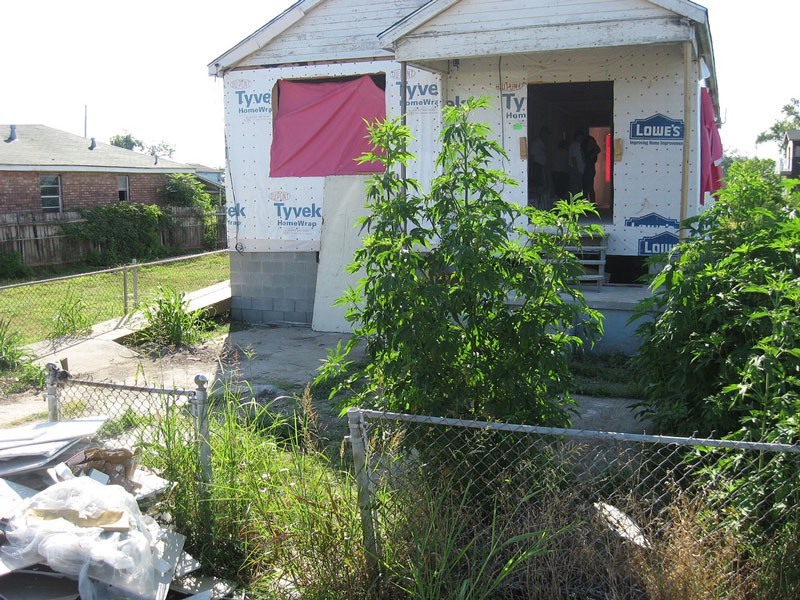
It’s not easy getting a cab to the Lower Ninth Ward. Even now, with most of the former population cleared out, some drivers still won’t cross the Claiborne Avenue Bridge unless it’s to take a carload of tourists to gawk at Hurricane Katrina’s Ground Zero. So when the third cab stops, it’s with some impatience that I ask if he knows the way.
“Oh sure, sweetie,” he drawls. “Born and raised. Born and raised.”
Norman is a retired firefighter who now drives cab to supplement his pension. Four years ago, after Hurricane Katrina, he patrolled the flooded streets by boat to pull survivors from rooftops and attic windows. When he learns that my companion and I have travelled from Toronto to volunteer with a grassroots rebuilding project called Common Ground Relief, chatty Norman gets very quiet. He reaches over, turns off the meter and looks at us intently. “I want to show you something,” he says.
Although it’s late, he drives several blocks past our destination, his headlights occasionally framing the sagging ruin of a house or an exposed foundation, the structure either washed away or bulldozed by the city. He distractedly points out the levees where the water first broke through, just steps from these front doors. Finally he stops at a cheery bungalow, its porch light blazing, a tidy little oasis of normalcy in the darkness.
“This is my home,” Norman says, his gruff voice choked with emotion. “Volunteers rebuilt it for me.”
He hopes his return will encourage his neighbours to come back too but there is much that stands in their way. With their homes and jobs long gone, we wonder, what incentive is there for anyone to return? And how much of a difference can small groups of parachuted-in volunteers make when there is such substantial work to be done?
The jarring reality, we will soon discover, is that volunteers like us are, unwittingly, at least as much a part of the problem as a part of the solution. Real change in New Orleans – the kind that will give the rest of Norman’s community a reason to return – is going to require solidarity of an entirely different kind. It’s not the “thousand points of light” feel-good charity work that Bush (senior) championed. Rather, it’s the rebirth of a civil-rights-era approach that put thousands of activists on the front lines of struggles, in direct confrontation with the State.
Since 2005, much of the city has been rebuilt, particularly in the wealthy Garden District and French Quarter. The Lower Ninth Ward, though, remains a wasteland. Of the 19,000 people who lived there when Katrina hit, only 3,600 have come back. Many of the rest have been mired in red tape trying to access insurance or relief funds for so long that they can no longer afford the trip home. The city seems to actively discourage resettlement, routinely levying large fines against absent homeowners for infractions such as excessive grass length, eventually going so far as to expropriate and demolish the offending homes.
The intentional displacement of low-income communities from this area is nothing new, says Jay Arena, a long-time activist in the fight to defend public housing in New Orleans, both before and after Katrina. “The city had wiped out half of the public housing even before the storm,” he explains, from 14,000 to 7,000 units during the 1990s and early 2000s. In 2008, under the guidance of the Bush (junior) administration, the Housing Authority of New Orleans (HANO) destroyed another 5,000 low-income apartments. Charity Hospital, providing care to tens of thousands of uninsured, was also shut down – all part of a push to replace public services with for-profit ventures.
“It’s about dismantling the public sector and letting charity groups address the ensuing social ills,” Arena fumes. “That has been the neoliberal agenda of the elite, local and national, post-Katrina.”
Arena is critical of the role of non-profits, foundations and universities in underwriting that agenda. With the U.S. Department of Housing and Urban Development (HUD) poised to destroy public housing (which they label “concentrated poverty” to justify their efforts to eradicate it) across the country, New Orleans became the latest victim of an all-out offensive on the public sphere – a political and economic onslaught that swept the Global South in recent decades, under International-Monetary-Fund-imposed austerity measures, and that is now coming home to roost in the Empire’s backyard.
As Naomi Klein reports in The Shock Doctrine, only days after the hurricane struck, the Heritage Foundation, a prominent right-wing think tank, released recommendations for rebuilding the city on a privatized model. Among 32 changes that were quickly implemented by the Bush administration, the Foundation urged a disinvestment in the public school system. Vouchers are now issued by lottery to allow a limited number of low-income children to enroll in private school, leaving other students on waiting lists or simply languishing in underfunded public schools.
Meanwhile, thousands of families who used to live in public housing now live in privately owned apartments, paying more than 30 per cent of their income towards the rent and utilities that HANO’s “Section 8” vouchers fail to cover. “These were plans they had already drawn up,” Jordan Flaherty, a former union organizer and editor of Left Turn magazine, tells Briarpatch. “The storm was their opportunity.”
“What happened with Katrina is not just an attack on poor folks, but also an attack on black political power in the city,” he says. “Pre-Katrina, the teachers’ union was the largest and most influential in the city, and a source of middle-class black political power. After Katrina, everyone who worked in the school system, from janitors to teachers, was fired, and the union contract was cancelled.”
That shift in political power has also been evident in the changing demographics and political representation of the city, as the majority black city council was slowly replaced by a majority white council.
Arena suggests that despite the best of intentions, the thousands of student, faith-based and other volunteers who still flock to the city to gut and rebuild houses actually contribute to the neoliberal project of dismantling the public sphere. “We have Habitat for Humanity building a few private houses, while thousands of public homes are being destroyed,” he points out.
Similarly, Teach for America volunteers were brought in to fill the positions of unionized teachers who were fired, while volunteer health clinics now care for some of the thousands of patients abandoned by the closing of Charity Hospital. Describing the same trend in her native India, Arundhati Roy has called this phenomenon the “NGO-ization of politics”: “[Non-governmental organizations’] real contribution is that they defuse political anger and dole out as aid or benevolence what people ought to have by right” (Public Power in the Age of Empire, 2004).
Such volunteerism, Arena points out, is also a form of scabbing that drives down wages for workers. “These are jobs that could be performed by Katrina survivors who desperately need them,” he says. Louisiana’s unemployment rate, at six per cent, is still the lowest in the country, but is rising quickly, with 15,700 jobs cut in the last year as the recession began to take its toll on the state. Despite the potential jobs that construction could offer, most new houses are prefabricated out of state and shipped in, using local labour for only a few days at a time.
Meanwhile, the over 130,000 people who were displaced from New Orleans have had to seek work in other cities, particularly Baton Rouge, Gulfport-Biloxi, Mobile and Jackson. Many of these workers abandoned their skilled professions to work as cab drivers, short-order cooks and other low-paid positions. The “right of return” movement championed by grassroots community groups like C3/Hands off Iberville, with which Arena was previously involved, advocates the creation of jobs and the repair and expansion of public infrastructure to enable the displaced to come home.
Arena believes that some developers have been “icing out” black workers from what little construction is actually taking place, pitting migrant Latino workers against black locals. C3/Hands off Iberville is demanding the enforcement of Section 3 of the 1968 Housing Act, which stipulates that on HUD-funded construction work, at least 30 per cent of jobs must go to local workers. “This is by no means an anti-immigration campaign,” he says. “We’ve been fighting for a public works plan that would be open to all – documented, undocumented. There’s plenty of work to be done.”
The New Orleans Workers’ Center for Racial Justice (NOWCRJ), an advocacy group formed in the aftermath of Katrina, echoes Arena’s concern that black workers were “locked out” of the rebuilding process while immigrant workers were “locked in” by companies that falsely promised them security and permanent status for their sacrifices. NOWCRJ aims to organize across race and industry lines to build political power, encouraging the inclusion of labourers, guest workers and homeless residents in campaigns against international human labour trafficking, for the protection of day labourers engaging in dangerous work, and more.
Both Arena and Flaherty agree that such movement-based volunteerism, rooted in the civil rights tradition, is key to the solution. It is true solidarity, rather than the “thousand points of light” variety of volunteerism, that is needed, Arena says. “In the midst of this whole assault, we’ve had more than a million people come to the city [to volunteer]. We would have preferred to see people come down and support the struggles for public housing and public services.”
A failed attempt by the AFL-CIO to unionize hospitality workers several years before Katrina demonstrates the importance of taking cues from local leadership in establishing such solidarity, Flaherty adds. “If you’re not doing something with the guidance of those most affected, it simply won’t work.”
Make no mistake: volunteers are needed in New Orleans. Its poorest residents – and some of the most vibrant, warm and strong people you will ever meet – have been abandoned by a city and a society that is being deliberately rebuilt without them. But misguided efforts to help only mask the sources of their suffering. With “solidarity, not charity,” as a mantra, there is an opportunity for visitors who really want to make a difference to lend their time and skills to support grassroots groups that are taking a stand against a system of exploitation.


